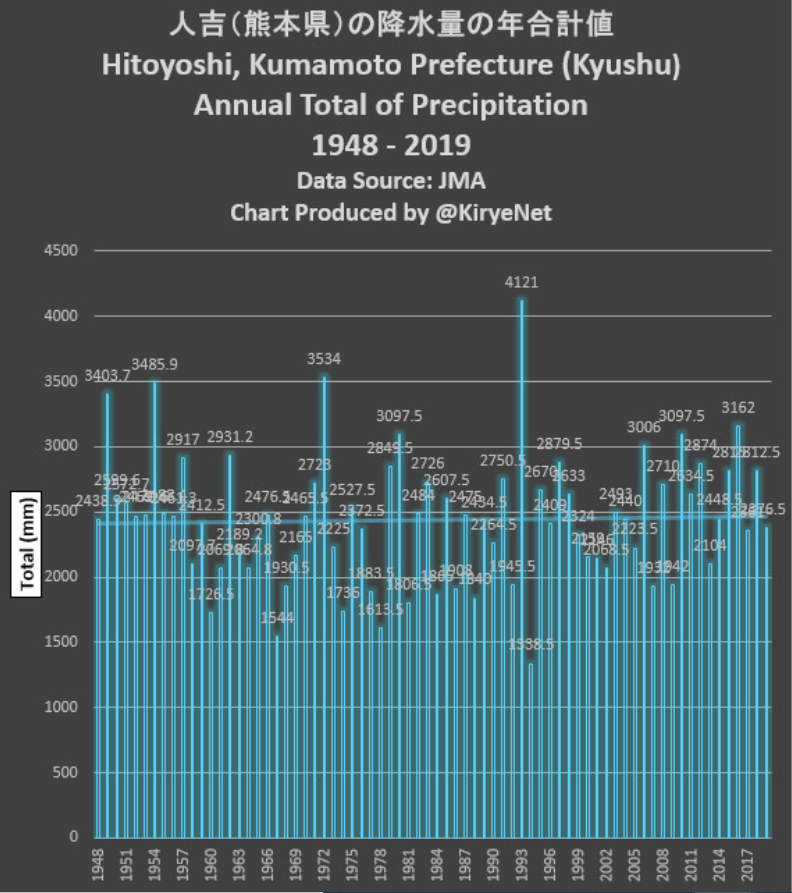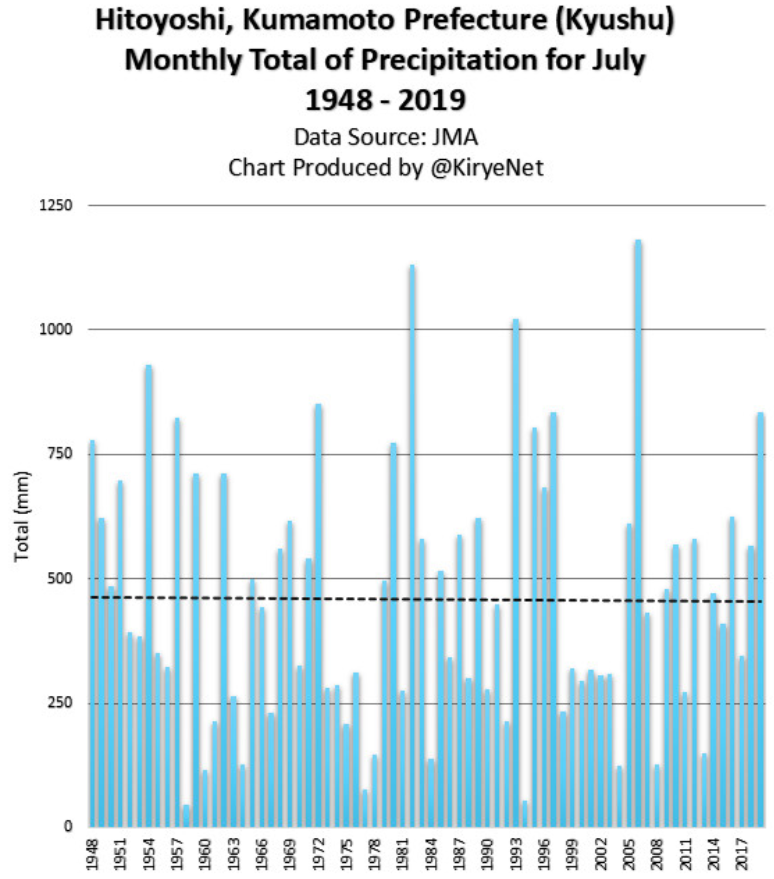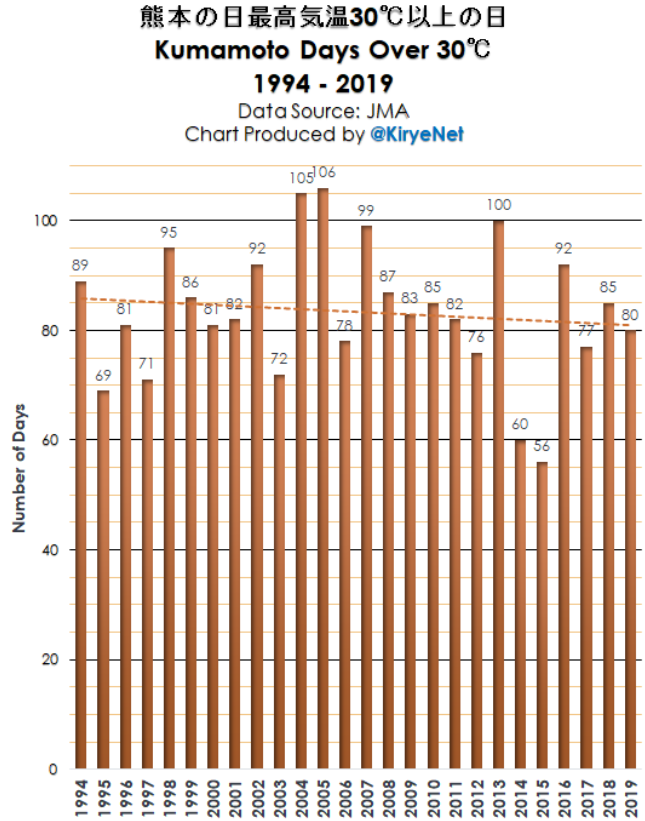The Kyushu region of Japan has been getting lots of rain lately, which has led to flooding and 62 reported deaths because local officials failed to properly heed warnings to evacuate.
The New York Times, however, blames it all on the “collision” of “demographic change and global warming” instead of incompetence by local authorities.
NYT claims: “More torrential rains”
“In recent years, climate change has spurred more torrential rains in Japan, causing deadly flooding and mudslides in a nation with many rivers and mountains,” reports Motoko Rich of the New York Times (NYT).
Unfortunately the NYT neither provides data nor cites any study showing this to be the case.
So we look at Japan precipitation trends going back decades – something the NYT journalists obviously neglected to do themselves (or they did, but then decided not to bring it up).
JMA data tell a whole different story
Using data from the Japan Meteorological Agency (JMA), Japanese blogger Kirye first plotted the annual precipitation anomaly for Japan since 1898:
Data source: here
The plotted data above show how Japan’s precipitation has indeed trended downward somewhat since 1898, and not risen.
The most recent decade in Japan has seen precipitation levels similar to that of the 1950s, and the very early part of the 20th century. Nothing unusual is happening here.
Next we look at the JMA annual precipitation data for Hitoyoshi, Kumamoto Prefecture itself since 1948:
Data source: here
Here we observe very little trend change at all. The recent rainfall in the region over the past decade has been similar to that seen in the 1950s. Extremes are no more intense or frequent today than they were in the past.
No July precipitation trend changes
Going a step further into greater detail, we look at the southern Japan region’s rainfall for July, going back to 1948.
Data source: here
Also the here we have the same story: no major trend changes to speak of. Very wet July months in fact were just as frequent and more intense in 1950s.
Decreasing hot days
Finally we look at the region’s number of days recording a temperature of 30°C or higher.
Data source here
Here as well the REAL trend is in fact bucking what the NYT always likes to suggest: increasingly more hot days because of global warming.
Incompetent authorities after all
Later in the article, Rich does ultimately get around to the real cause of the recent flooding deaths in Kyushu: “The Japanese government issues standardized evacuation protocols, but they do not take into account the unique characteristics or terrain in different parts of the country, said Professor Tsukahara of Kyushu University.”
But all in all, very shoddy journalism here by the New York Times. They would do their readers a service by checking the data instead of lazily repeating old, exaggerated narratives.









[…] Junk Journalism: NYT’s Claim “More Torrential Rains” In Japan Takes A Bath, No Basis […]
I think we get a little smug about trying to prove that nothing is really changing. China has flooding, Japan has flooding, and lo, there is a thunderstorm outside my window. Ok, they had flooding back in 1950. But what if precipitation does change on decadal time scales? By cherry picking your data range you can prove anything, and use it as an excuse to ignore things that really are important.
The IPCC claims that trends in precipitation SHOULD be visible if human-caused Climate Change effected floods. They found no trends on any time-scale of any statistically relevant length anywhere in the world.
So there are NO trends. Which means that floods are NOT among the claimed effects of human increased carbon dioxide.
There is no cherry picking if the IPCC points to the beginning date of human effects – 1950 – where the trend would be visible if it were there…
Perhaps part of the problem is the difficulty in believing that Japanese authorities could be incompetent.
The NYT ought to stick to reporting on the Mayor – he of serious errors of judgment.
At least his stupidities are interesting, although some lead to sad results.
Doesn’t the Bible say something like: Yo rains and floods ye will always have with thee.
They won’t have ol’Bill de Blasio to kick around for much longer.
My thoughts on weather predictions from climate ‘science’ —
1. The problem as I see it is that these ‘climate scientist’ do not know (or want to know) about chaotic systems. When looking at climate you realize it is a chaotic system build of many interlinked chaotic sub-systems with lots of feedback paths.
Statistical averaging of a few factors within such chaotic systems reveals what? IMO very little — it certainly can NOT tell you what the trend of the chaotic system (on a local or global scale) will be. It can never indicate the changes that might happen in local areas.
2. Climate is NOT global!
Climate is at best regional, and as such is very specifically dependent on LOCAL variables (within the chaotic weather system).
Japan like parts of China are prone to heavy rain, deluges, and flooding, they also can get periods of drought. But ON AVERAGE (over a long enough timescale) everything appears to dither around a normal figure. What specifically are all the changes in the climate regime that cause these more extreme events to happen? Does ‘climate science’ understand how the water cycle works over the whole world to a local level — IMO NO!
What does this tell us about the current state of ‘climate science’ and weather prediction? IMO it says we do not know very much, understand little, and have not measured to fine enough detail enough factors that affect our weather/climate to be able to grasp the totality of how the climate operates.
Taking my cue from history (things like http://www.breadandbutterscience.com/A_Chronological_Listing_of_Early_Weather_Events.pdf ), it appears that as the world changes from warm to cold, or cold to warm periods then the weather/climate becomes very erratic and volatile, and that more stable periods of cold or warm are usually less changeable. So where are we now? Here’s an indication — https://climate4you.com/images/VostokTemp0-420000%20BP.gif
Sorry for the excessive bold, this is due to my extraordinary lack of proof-reading skill.
The bold should only encompass the word ‘all’.
Sorry all for the additional difficulty this failure will make in reading my piece.
Now fixed – sorry it took me so long to get to it.
Thanks Pierre much appreciated.
Take the “not good” out of proofreading with this.
https://htmledit.squarefree.com/
Trust me. It helps.
You said it better than I could.
[…] https://notrickszone.com/2020/07/10/junk-journalism-nyts-claim-more-torrential-rains-in-japan-takes-… […]
[…] https://notrickszone.com/2020/07/10/junk-journalism-nyts-claim-more-torrential-rains-in-japan-takes-… […]
[…] Junk Journalism: NYT’s Claim “More Torrential Rains” In Japan Takes A Bath, No Bas… […]
[…] https://notrickszone.com/2020/07/10/junk-journalism-nyts-claim-more-torrential-rains-in-japan-takes-… […]
[…] https://notrickszone.com/2020/07/10/junk-journalism-nyts-claim-more-torrential-rains-in-japan-takes-… […]
[…] Junk Journalism: NYT’s Claim “More Torrential Rains” In Japan Takes A Bath, No Bas… […]
[…] https://notrickszone.com/2020/07/10/junk-journalism-nyts-claim-more-torrential-rains-in-japan-takes-… […]